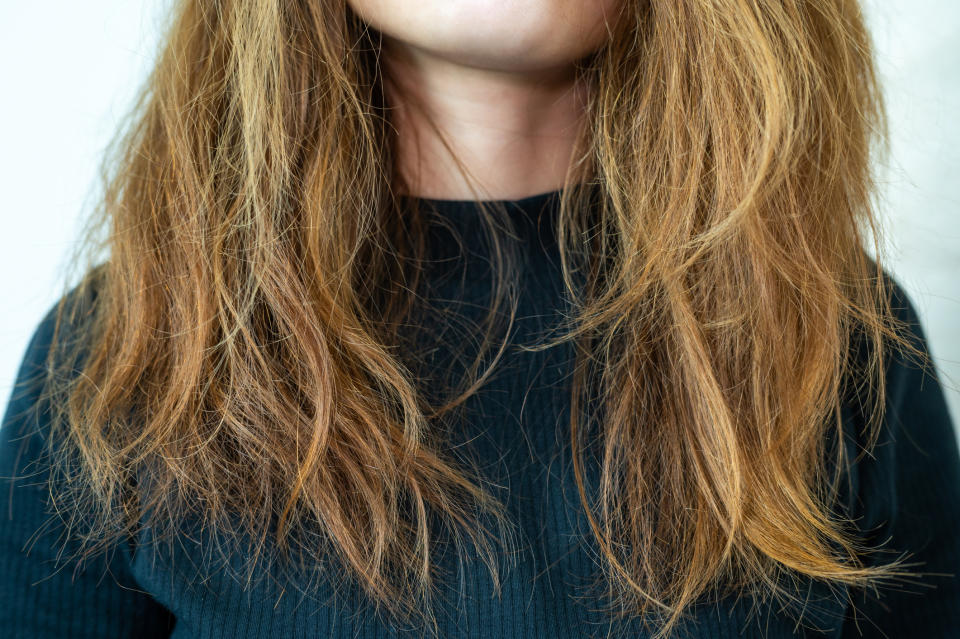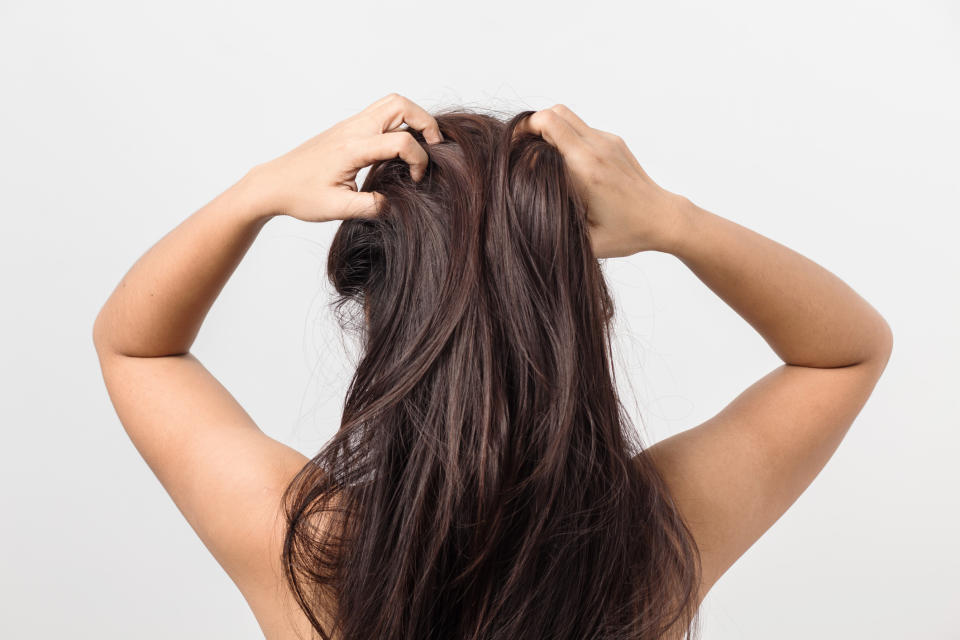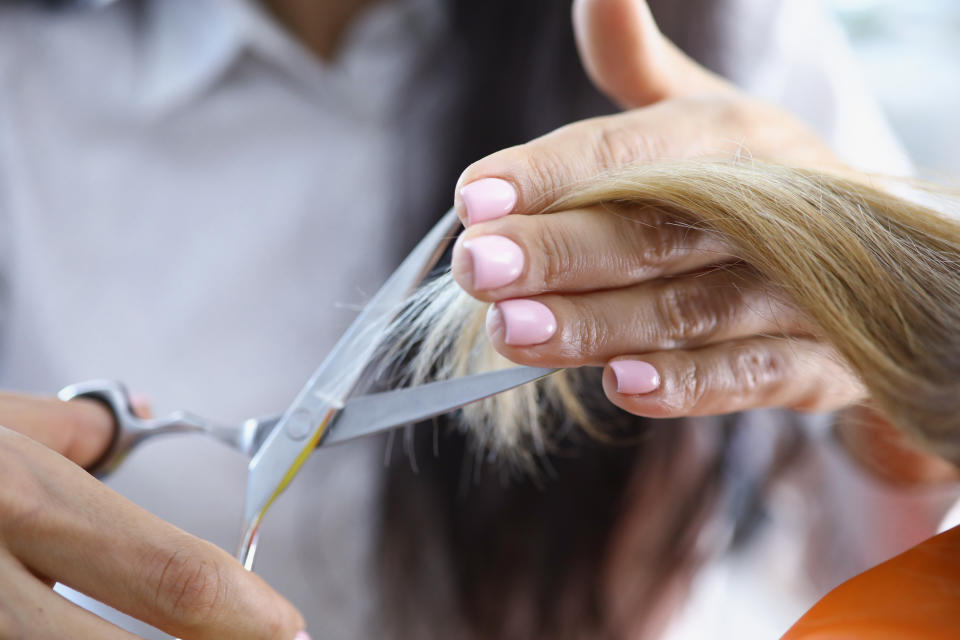Why Your Hair Is So Dry: Pro Stylists Reveal the Sneaky Culprits + How to Fix It Fast
The struggle is real. You do everything right when it comes to maintaining your hair — try to limit heat styling, condition it regularly and don’t go overboard with the chemical treatments, yet you’re still faced with dry, parched strands that break off when you brush them. That might have you questioning, why is my hair so dry? We feel your pain and decided to tackle the topic with top experts. Read on for their best advice that will get your hair lush and healthy.
The science behind dry hair

“Dry hair is primarily about disrupting the hair’s outer layer, known as the cuticle. Healthy hair has a cuticle that lies flat, protecting the inner layers. When the cuticle is damaged, it raises and opens up, allowing the moisture to escape and external elements to damage the hair shaft, leading to dryness,” explains Alan J. Bauman, MD, founder, CEO and medical director of Bauman Medical Hair Transplant and Hair Loss Treatment Center.
Scientific studies have shown that UV rays, lack of humidity and pH imbalance can impact the hair cuticle's integrity. For instance, a study published in the International Journal of Cosmetic Science noted that UV exposure could lead to protein loss in hair.
What causes dry hair
Heat styling is the #1 culprit. A 2011 study in the Annals of Dermatology showed that as time and temperature under a blow dryer increased, so did the damage to the hair’s structure.
While there’s no doubt how much time your tresses spend under the blow dryer can make or break a cuticle, other factors are at play, too. “Generally, the things that cause dry hair are excessive heat styling, overexposure to the sun or chemical processing damage, which can strip hair of its natural oils. Lack of moisture in the air during winter and too much time in the ocean saltwater or chlorinated pool water during summer also dries out hair,” says Maria McCool, founder of Calista Haircare.
The tap water you shower with could also contribute to a lack of luster in your locks. A study by water softening company Culligan showed that people with hard water had drier hair than those who didn’t because the natural build-up of minerals in the water caused clogged hair pores and an overall lack of vitality and shine.
Unfortunately, you can also add hormones to the list. Menopause is a culprit for dryness throughout the body and dry hair, too, since lack of estrogen decreases scalp sebum (oil) production. That leads to a dry scalp and, as a result, dry strands since the hydration isn’t there to work itself down. “In addition to aging and hormones, genetics can also play a part in whether or not you have dry, frizzy hair,” says Dr. Bauman.
Dr. Bauman notes that certain health conditions or nutritional deficiencies can also impact hair hydration and health.
Related: Is Blow Drying Hair Bad? Experts Reveal the Pros and Cons — Plus How to Prevent Damage
What are the signs of dry hair
When your hair is dry, you’ll notice static, brittleness and tangling, and it won’t be as shiny as it should be. “Dry hair also won’t behave properly,” says celebrity hairstylist Chaz Dean, who has worked with Gwyneth Paltrow and Juliana Margulies. “It’ll be difficult to style even with products designed to tame frizz.”
Other signs of dry hair include a rough texture to the touch, dullness, lack of elasticity, breakage, split ends and an itchy, flaky scalp.
How to prevent dry hair

The good thing about dry hair is that it can be preventable. And making the following changes to preserve the integrity of your strands and keep them from drying out in the first place.
1. Limit sun, heat, cold and wind exposure
Protect your hair like your skin, advises Genn Shaughnessy, hair, makeup and wardrobe stylist, who has worked with Judy Greer and Carrie Underwood. “Cover it with a hat during sun exposure and use an SPF hairspray for prolonged periods to protect it from further damage,” she advises. A leave-in conditioner with UV protection, like Aveda Sun Care Protective Hair Veil (Buy from Aveda, $40), does the trick.
Exposing your hair to extreme cold and wind is the same. “Tuck it in your coat and under a soft hat if possible. Be mindful of coat zippers and friction from rubbing against tight scarves and big collars, as those can also damage hair,” explains Shaughnessy.
2. Let your hair down once in a while
Constantly wearing your hair up in a pony, especially while you sleep, can break already brittle strands. “Keeping your hair pulled up and back in clips and ties creates friction, which causes breakage and brittle ends,” she says.
3. Consider temperature when heat styling
We already know frequent heat styling is drying, but it’s unavoidable for some. If you can’t limit the amount of heat styling you do, Shaughnessy recommends a temperature adjustment to stop heat damage in its tracks.
“The coarser the hair, the higher the heat; the finer the hair, the lower the heat. You do not need to use your irons at 400 degrees if you have fine, thin hair! Start lower and see the lowest that will work for your hair,” she advises.
4. Trim dead ends regularly

If your ends are dry and split, evaluate how often you’re getting them trimmed. “You should at least get a haircut every quarter. I’m not talking about taking inches off, just ask your stylist for a dusting of the dead ends. This will also affect how dry your hair looks and feels,” says Shaughnessy.
5. Apply your products this way
Since the scalp produces oil, you want to avoid weighing down its sensitive skin with a buildup of products. “Concentrate most of your product on the ends and work your way upwards, avoiding the scalp, unless your scalp is really dry,” suggests Shaughnessy.
6. Use a heat protectant on hair when using hot tools
Anytime you heat style, always use a protectant beforehand, which provides a heat barrier for parched strands. "Always follow it up with a moisturizing leave-in cream all over the hair and oils only on the dry, crispy ends,” Shaughnessy adds.
7. Add hydration to the air in your home
Dr. Bauman says you can also sleep with a humidifier in your bedroom at night, which helps add moisture to the air, especially during the winter when dry heat can wreak havoc on skin and hair.
Another at-home hack? Sleep on a silk or satin pillowcase, which helps your hair glide smoothly over the fabric at night while you toss and turn, preventing breakage. Cotton pillowcases can draw moisture away from hair, whereas silk or satin doesn’t.
8. Eat a balanced diet to keep hair hydrated and healthy
What you eat affects the health of your skin and hair, and vitamin deficiencies have been studied as a root cause of hair breakage and less. To avoid this, Dr. Bauman says to ensure you get enough vitamins and minerals to support and keep your hair strong and healthy. These include Vitamins B, C and Iron, found in foods like salmon, guava, greek yogurt, spinach, poultry and sweet potatoes.
How to fix and reverse dry hair
Besides taking preventive measures, there are things you can do daily to fix dry strands. For starters, how you care for your hair matters. Opting for shampoos and conditioners labeled hydrating or moisturizing, with ingredients like argan oil, shea butter or coconut oil, will repair frayed strands and split ends.
Blondes, take note: that ‘purple’ shampoo you’re using to get rid of brassiness could also be sapping your strands of much-needed moisture. “Be mindful of toning shampoos,” warns Shaughnessy. “Using a purple shampoo as your regular shampoo is very drying. Make sure you’re pairing it with a hydrating conditioner if you are.”
Using a hair mask every 2-4 washes can also be an effective way to replenish moisture. Hair masks offer specialized care, delivering essential nutrients and moisture that regular daily care might not provide. And Shaugnessy swears by leave-in conditioning treatments like Keratherapy (Buy from Keratherapy, $26), which strengthens and hydrates the hair while leaving it in prime styling condition.
For more hair care secrets, click through these stories:
How to Curl Short Hair: 5 Easy Techniques That Make Strands Look Thick and Bouncy
How to Prevent Split Ends According to Celebrity Hairstylists
Hairstylists Reveal The Best Foolproof Ways to Keep Hair Straight Overnight
Woman's World aims to feature only the best products and services. We update when possible, but deals expire and prices can change. If you buy something via one of our links, we may earn a commission. Questions? Reach us at [email protected].
